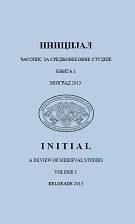Унутрашњи хоризонт сопства Светог Августина : окрет ка унутрашњости, метод и проблем сазнања
St. Augustine’s Inner Self Horizon: The Inward Turn, The Method and the Problem of Knowledge
Author(s): Una PopovićSubject(s): Philosophy
Published by: Центар за напредне средњовековне студије
Keywords: St. Augustine; the inward turn; self; philosophy; God; knowledge; reflection; method
Summary/Abstract: This essay is dedicated to the analysis of the philosophical aspect of St. Augustine’s thought, in the sense that St. Augustine, besides being one of the thinkers who defined Christian thought, also figures as a redefiner of earlier philosophical thought in the new, Christian context. Through this process, themes and contents inherited from ancient philosophy were being adopted and reshaped from the Christian perspective, thereby directly refining the understanding of the Christian position itself. The analysis offered in this paper attempts to show what exactly is this Christian position and how it enables fruitful philosophical thought. Analysis is focused on Augustine’s determination of the inner self horizon, which not only represents an entirely new motif, unknown to ancient philosophy, but also provides insight into the shifting of thought towards new philosophical positions based on the Revelation. The main subjects of analysis are the inward turn, the structure of cognitive faculties of the human being, as well as the methodological aspects of this process. First, Augustine’s quest for the definition and fulfillment of his personal self is revealed as the integral part of his quest for God, both in his pre-Christian and Christian years: only out of the perspective of the inward turn can these quests be fulfilled. Then, this inward turn is more precisely and more thoroughly investigated through the analysis of the structure of human cognitive faculties, resulting in two different, yet similar inward turns, both constitutive for the foundation of the self and innovative in their methods. Finally, Augustine’s self is to be founded in its relationship with God, which is not merely ontological, but should govern every aspect of human life. As a result, the threefold structure of human cognitive faculties stands for three different modes of human existence, as well as of self-knowledge and self-determination. Therefore, Augustine’s self is presented as the place, topos of new Christian thought, which is the only possible position of thinking for a Christian and thus the new position of philosophy, as promulgated by St. Augustine.
Journal: Иницијал. Часопис за средњовековне студије
- Issue Year: 2013
- Issue No: 1
- Page Range: 11-31
- Page Count: 21
- Language: Serbian

